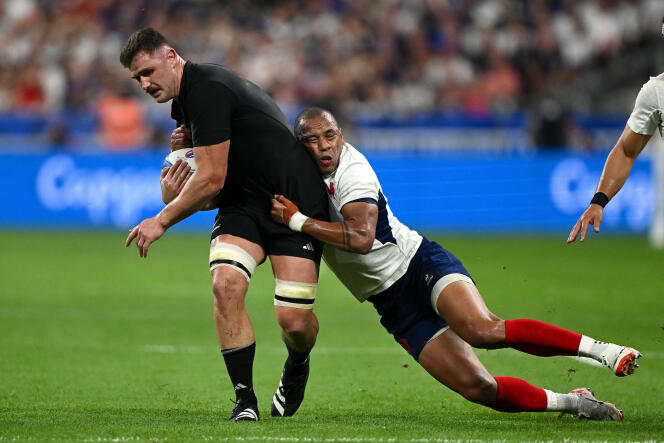


Words were flying around the Stade de France dressing room. "We've been waiting four years for this, guys. A lot of guys have been there, they've worn the jersey (...), they'd dream of being there (...) When we're tired, we don't give up: We think of those guys!" In a speech captured on camera by the French Rugby Federation (FFR), Gaël Fickou harangues his teammates just minutes before the French national team faced New Zealand in the opening match of the 2023 World Cup on Friday, September 8, which they would go on to win.
At 29 years old, Fickou may not be the eldest member of the team, but he holds the highest number of caps in the French squad with 82 appearances. They are all set on achieving the coveted goal of a triumphant victory on home turf. Everyone listens religiously to what the defender has to say, making him a leader both on and off the pitch. Rested along with most of the starters during the tight victory over Uruguay (27-12), the Racing 92 player will be on the pitch on Thursday, September 21, to face Namibia in Marseille during the French team's third outing of the World Cup.
"I've always taken the bull by the horns. Ever since I was a kid, I've never been a follower, I've always been a guy who really imposed things," said the international player, whom we met in the spring. On the field as in life, the man who earned his first cap in 2013 at the young age of 18 years old, is not one to procrastinate. However, Fickou, who tells his story in Derrière l'Armure ("Behind the Armor"), was not born to be a rugby leader. With experience, his strong temperament has broadened his palette. "Very few players come in at 18 and say they want to be the boss," he said. "It's an evolution that takes place over time." Especially when, like him, you only discovered your sport late in life.
A child of the Berthe housing project in La Seyne-sur-Mer (southeastern France), Fickou grew up in "a square inside which a dozen towers were built" and from which he never left. A small village with its own codes, where everyone lived as a community, and where "rugby didn't exist, or almost didn't." A number of professional footballers sprouted up in the Var housing estates, serving as role models for young Fickou, who was then a local football hopeful. Rugby was not on the cards for the kid, despite its proximity to Toulon, considered to be one of the sport's strongholds. "I didn't even know you could be a professional rugby player," he said.
You have 68.03% of this article left to read. The rest is for subscribers only.
